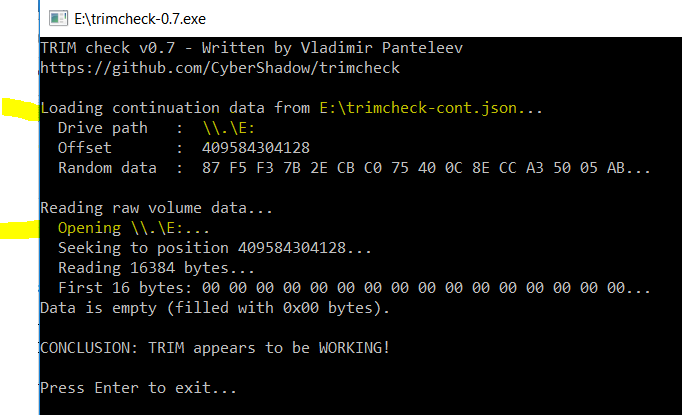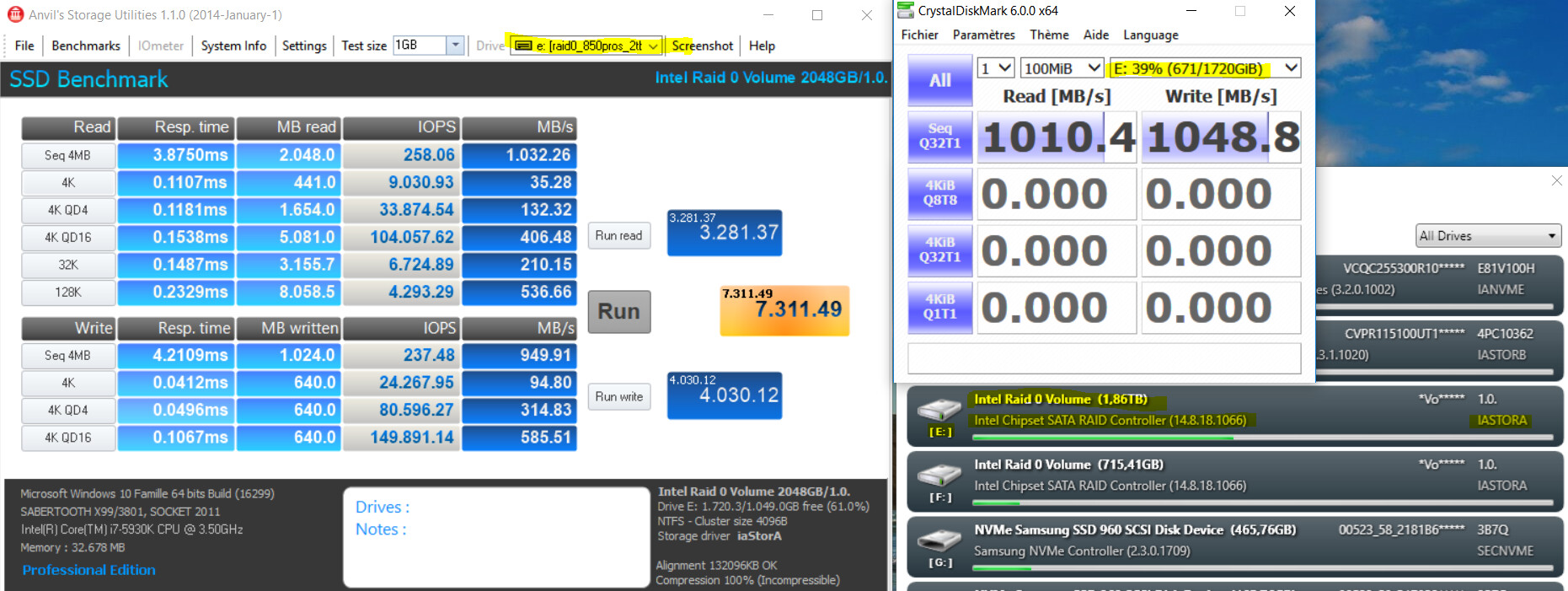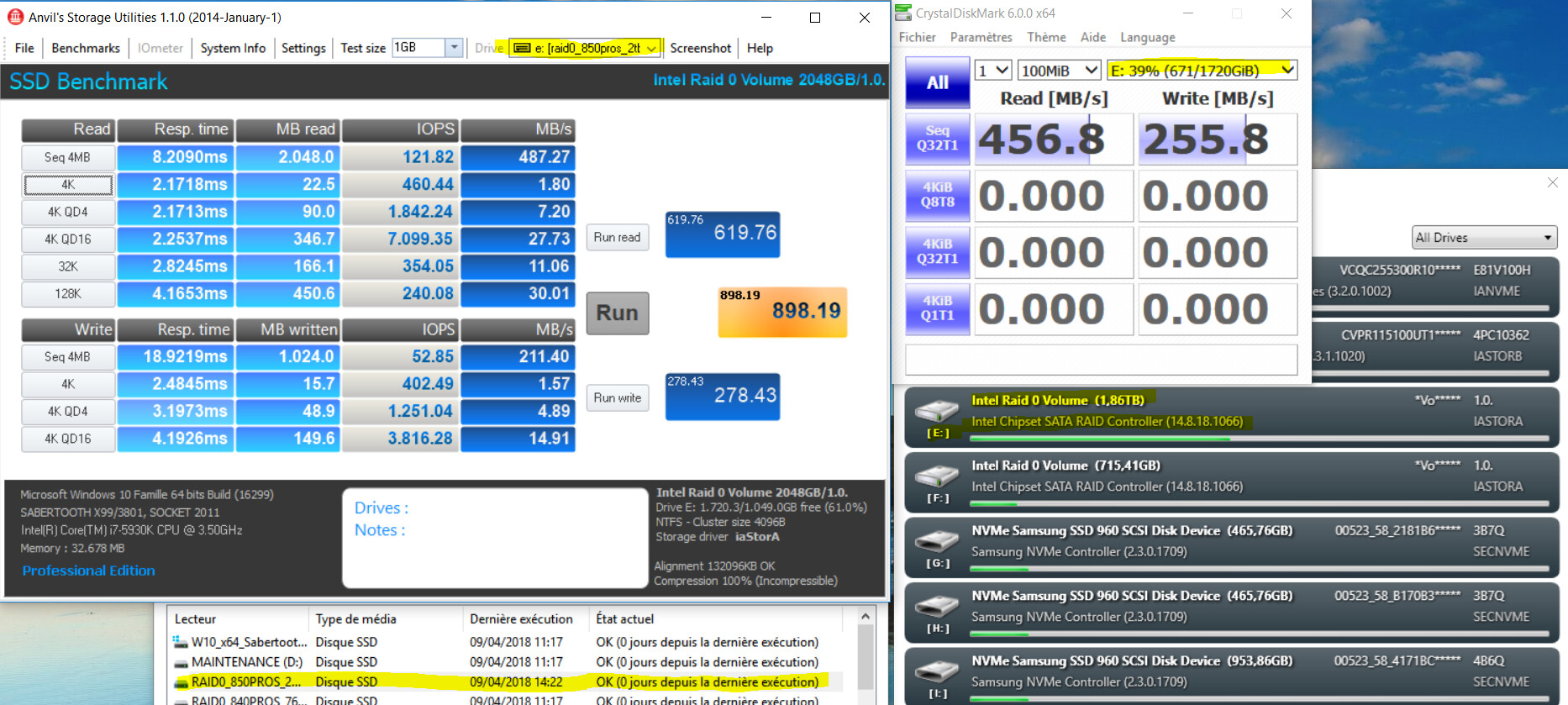@FernandosBugBear :
Welcome at Win-RAID Forum!
If you want help from us, you should give us some informations about your system (mainboard model/chipset, HDDs/SSDs, SATA mode, OS).
Furthermore you should have read the start post of >this< thread. By the way: It may be a good idea to move this discussion into the just linked thread.
Regards
Dieter (alias Fernando)
Ok, sorry about that, my system is as follows:
Motherboard: Asus X99-a, Cpu: Xeon E3 2678 V3(Lga2011-3), Ram: 16gb G.Skill Ripjaws 2800mhz @ 2250mhz, Storage: 4xSamsung Evo 840’s(250GB/Raid 0 Configuration mode), PSU: Enermax 1020W Revolution, Graphics: 2 Gtx 970’s @ 1580mhz+/7800+, OS: Wn 10 x64 Build 14291
And thanks for your reply, I’ll go ahead and start a new discussion on that particular thread.
Hello again, this is my second post, Thanks Fernando for replying my first post.
First off before I begin my problem, heres my systems specs:
Motherboard: Asus X99-a, Cpu: Xeon E3 2678 V3(Lga2011-3), Ram: 16gb G.Skill Ripjaws 2800mhz @ 2250mhz, Storage: 4xSamsung Evo 840’s(250GB/Raid 0 Configuration mode), PSU: Enermax 1020W Revolution, Graphics: 2 Gtx 970’s @ 1580mhz+/7800+, OS: Wn 10 x64 Build 14291
As I stated before, this was my original post on another forum:
http://forums.guru3d.com/showthread.php?t=406338
Before I state my problem, I have used the latest Samsung magician software(4.9.5) and have used the Advanced optimizations on ALL 4 SSD’s and have tested the performance of my SSD’s individually with Crystalmark benchmark, ALL 4 drives are in perfect working condition, Full read and write speed, over 500+MB/s on both Read and write.
Basically my Raid0 speed on 4 of my Samsung Evo’s(250gb) in raid 0, speed has basically cut down in half on both read and write speed.
Crystalmark should show at least 1650-1700+MB/s on read and 1300+MB/s on write(W/write back cache turned on), but its like 800+MB/s on read and 600+MB/s on write. One person on the forum told me to update my firmware(Orom) and also the modded bios firmware he made for me to update the microcode and others, I tried using various card readers and flash drives, its a no go. Asus flashback usb method does NOT work, Flashing Orom won’t go through as it says in red something about error: Can not detect etc,etc,etc, I can’t even verify what version of Orom I am using, won’t let me.
Then After everything has failed, I download a file from station-drivers .com, Intel Management Engine components, after that, did crystalmark, everything ran great and went back to normal again, then just recently, it started all over again, this time I re-installed win 10 x64 14291, tried installing rst and without the intel chipset drivers as one forum poster stated that it was giving him problems with performance, I did that and still my speed is still cut in half, both read and write. I tried to install the latest raid Orom firmware but its a no go.
Well need to get going for a little bit, I’ll check back later, Thanks Fernando and to everyone.
EDIT by Fernando: Removed unneeded blank lines (to save space and for an easier reading the text)
Oh, I almost forgot to mention, the usb stick I tried to flash the Orom Firmware:
Sansa Cruzer(32gb version)
Digital Concept Memory card reader
Another Unknown Card Reader
All have failed including The Asus flashback method, and speaking about the Asus flashback, I tried in all 4 formats: Fat, Fat32, Exfat and ntfs
All don’t work, thanks again.
In regards about What version of intel RST I was using, I used from the latest then downgrade from early as beginning of last years drivers, and it was a no go as I been told to closely match the version of Orom to the version of the RST, It didn’t matter, lol.
Have you already checked the RAM sticks and the PSU?
Is there anything overclocked?
I am pretty sure, that it works and suspect, that the failure has been caused by one of the following mistakes:
a) usage of a wrong USB port,
b) usage of a faulty USB Flash Drive (should be a proper working FAT32 formatted USB 2.0 drive, which contains nothing than the "pure" modded BIOS file, renamed according ASUS’s USB Flashback rules),
c) not correctly modded BIOS or
d) wrong handling of the USB Flashback procedure.
Although I doubt, that your problem has anything to do with the Intel RAID ROM version, here is my question: Which Intel RAID ROM version are you using now?
Its from the bios 2101(Latest), Orom revision is like 13. and the rest I have to check, from what I understand, its several years old.
Cpu is overclocked to 2.95ghz, Bclck to 105.5, absolute highest and most stable I can get.
Also in regards about the usb flash drive, from what I understand is that not everyone single usb flash drive is going to work with asus usb flashback, some way work and some may not work at all.
UPDATE:
Tested the cpu @ 2.55Ghz, memory @ 2133mhz, Read/Write = still same :(.
EDIT by Fernando: Unneeded parts of the fully quoted text and blank lines removed (to save space)
If you want a stable RAID0 system, you should better avoid any overclocking.
Please retry your benchmark tests after having chosen the "optimized default" CPU and RAM settings within the BIOS.
Ok, I took your advice about using:
Load Optimal Defaults, and I did just that, turn on raid, went into windows and guess what???
Problem or Problems within this situation has stopped, what was the root of this cause exactly?, I am still checking on it as I just got raid to work properly.
BRB later for updates, Many thanks Fernando…
-Fernando’sBugBear!!!
According to my own experience it is not a good idea to overclock the CPU or RAM settings while running a RAID0 system.
I have done a lot of benchmark comparison tests with 2 different RAID0 systems (my old Intel Z68 and my current Z97 one) and found out, that I got the best results, when I didn’t try to overclock anything.
Ok, I tried to re-create the problem to find out what was exactly causing the issue.
First I originally thought that memory latencies was the main culprit, I set all memory timings to auto, then gradually I made them tight to were I had it once before, and guess what???
My raid0 speed is back to normal still after the load optimal defaults, 1600+Mb/s Read and 1300+Mb/s Write.
My Bclck is now at 105.5 like I had it before, cpu speed @ 2.95ghz(Very stable).
I do know that I also stress tested the memory and its latencies, all good.
I am going to let it go for now since its back to normal, and if it happens again, I’ll just load optimal defaults and just leave it there and see if it does it again(It shouldn’t).
Well everything looks like its back to normal again(For now).
Do you highly recommend me upgrading the Orom?
I might need a different usb stick, all my readers, sticks,etc ain’t working.
I heard that a 16gb crucial flash drives works great on my mobo during asus flashback method, some other flash drives won’t work worth diddly doo squat.
It is fine, that you found out the reason for your not satsfying benchmark results.
Yes, but this only makes sense, if you are using or going to use the "best" Intel RAID0 driver v11.2.0.1527.
I really don’t understand why they mention UPS at all. 99% of my unexpected system shutdowns are due to a system failures like a BSOD and I really don’t think a UPS will help much in those situations. And here in Norway I can count the times we’ve had black outs on a single hand in 40 years. A RAID card with on-board ram and battery/capacitor backup on the other hand would be able to save it’s unwritten data in cases of BSOD.
If I was supposed to bet money on how the help text came became… well… how it is, my guess would be that some kind of technical guy with lots of insight started writing a very technical text including raid cards, battery back up and so on… but on it’s way to production some one said "this text is to difficult, rewrite it"… and then some one did… and now I don’t think it make much any sense at all. ![]()
Fernando, I searched my BIOS & wasn’t able to find this- ◦If you want to improve the performance of your system, you should set the “CPU C-Status Support” (the specific name may be different) to “Disabled”.
I’ll do some further research, I looked it up in my ASUS manual & didn’t see it there either however even tho I have a UEFI BIOS it may differ from the ASRock. Is there a gain to be found from moving it into “C” Status Support rather than unlocked? P.S. Thank you for all your help thru my fresh install, It’s running smooth & as of yet I haven’t tested the SSD speeds. One other thing, if you were going to pair two 256GB SSD’s into RAID0 what brand stands out in your opinion? Thank You ![]()
The related settings should be within the "CPU Configuration" section of the "Advanced" part of the BIOS.
Provided, that you meant SATA connected SSDs, I would take either 2 x 256 GB Samsung 850 Pro (better performance) or 2 x 250 GB Samsung 850 EVO SSDs (better price/performance relationship),
@Fernando ,
I agree totally with you, stability is much more important than the system performance.
This is the reason I have done some comparitive benchs using different SATA RAID0 driver versions on the same machine.
During my tests I got a ‘bad’ surprise, and I am sure you can reproduce the ‘abnomaly’ described here below on your side , even using a different hardware, because I do suspect a TRIM (W10 “optimization” option) the source of erratic malfunction when using Intel SATA RAID0 technology.
The screenshots are self speaking on the tests done:
Normal performance:
TRIM function is OK:


Abnormal Performance:

How to reproduce this severe (quasi permanent) malfunction ?
It is quite easy.
You start a W10 "optimize" function on the RAID0 disk, and wait up to the completion to get this:

After that ‘optimization’ process you get the “Abnormal” situation.
You can try several times the benchs (ANVIL, ATTO, CDM, etc…), the situation does remain ‘abnormal’ until you decide to wait for a very long period of time (20 minutes or more) or you decide to reboot the PC.
Th ereboot PC does reinitialize correctly the RAID0 driving.
I do suspect Intel RAID0 drivers (whatever the version used) does malfunction for a long period of time after any W10 “optimize” operation (or ANVIL ‘trim’ operation).
@100PIER :
Since your last post has much more to do with the topic “Performance of a RAID0 array” than with the Intel RST RAID drivers, I have moved it into this Sub-Forum.
Here is my reply:
Although I have used different Intel RAID0 systems very often and did my benchmark comparison tests with very short intervals, I have never seen these “abnormal” benchmark results after having run the Win10 “Optimizer” or traggered TRIM by using Anvil’s Storage Utilities. Furthermore I doubt, that your results are driver related.
What you should never do is running a benchmark test immediately after having sent a thunderstorm of TRIM commands into the SSD resp. RAID array. If you watch the LED lights showing the activity within the target drive after having run the “Optimizer”, you will realize, that it takes some time until the lights are and stay completely off.
I always wait at least 2 minutes after having “TRIMMED” the target drive, before I start with the first benchmark test.
@Fernando ,
Thanks for your opinion.
I do agree the thunderstorm of TRIM commands on a RAID0 does take some time, specifically for large SSDs.
I thought that when W10 does indicate OK ‘optimize’ is completed the operation of optimization is effectively done.
On my tests the W10 operation from 0% up to 100 % is about one minute. (It is a 2TB SATA RAID0 850PRO). (For a single 960PRO 1TB it does take about 3 secondes only).
But apparently even after getting the “Windows 100% OK” done the TRIM salve is not finished !! May be a background task is running a long time.
On my side I have had to wait for may be about 10 minutes additional delay or more to be sure the SSD RAID0 performance goes back to normal.
For sure the 2 minutes delay for the first bench test is not sufficient in my case.
I agree with you. The SSD RAID0 array I have used in the past has only a size of 2x256 GB. That is only 25% of your RAID0 array size.
Do i need to install the RST software+Driver 11.7.4.1001 for my X58 ICH10R or just Install the driver?
Sure i’ve read somewhere you install the software then remove the cache in devices then uninstall the RST software to get the cache boost still?
P.S i have Intel Bios Version 11.6.0.1702 software installed
@trebleta :
For systems with an Intel RAID0 array I recommend to install the complete Drivers & Software Set and to enable the write-back caching option.
Once you have done that, you can either uninstall the RST Software or disable the Intel RST Services (to avoid, that they are permanently running in the background and decrease the performance).